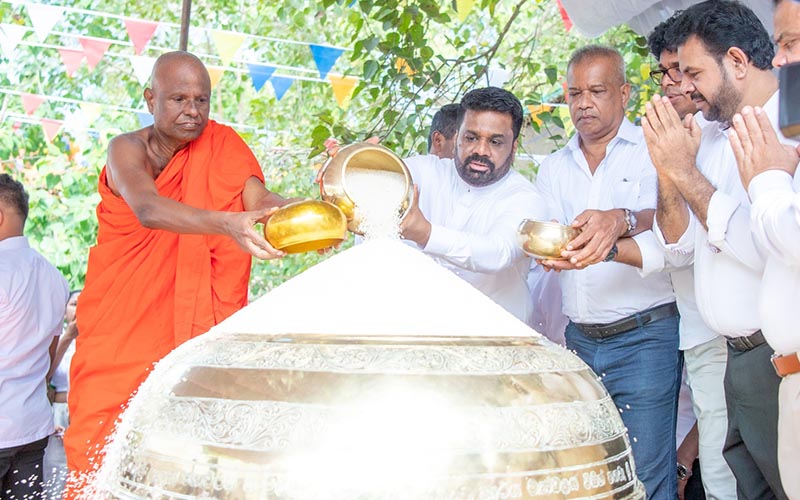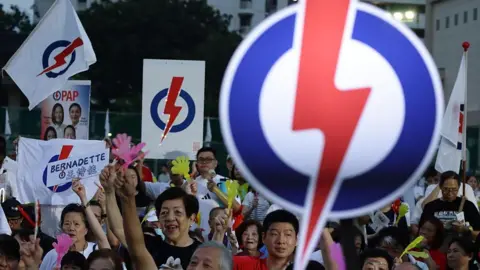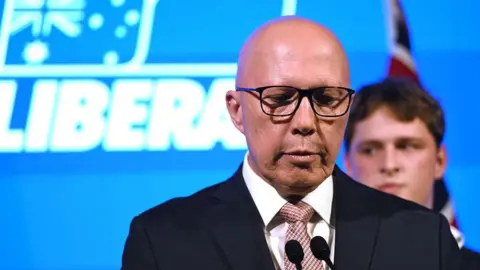Latest News
We are working to stabilize and restructure an economy that was in disarray -President

The National New Paddy Harvesting Festival (Aluth Sahal Mangalya), a traditional annual ceremony of offering the first portion of the freshly harvested Maha season paddy to the sacred Sri Maha Bodhi, was held this morning (04) under the patronage of President Anura Kumara Disanayake at the historic Sri Maha Bodhi premises in Anuradhapura.
The ceremony was organized by the Ministry of Agriculture and the Department of Agrarian Services under the theme “In unison, let us cultivate the land, to build a self-sufficient nation” (අහරින් ස්වයංපෝෂිත දැයක් තනන්නට එක මිටට ගොවි බිමට), following the guidance of the Atamasthanadhipathi, the most Venerable Pallegama Hemarathana Nayaka Thera.
This ritual, which dates back to the era of ancient monarchs, saw the participation of farmers from across the country. In accordance with tradition, they prayed for timely rains and fertile fields and invoked blessings for a self-sufficient and prosperous economy through agriculture.
President Anura Kumara Disanayake first paid homage and received blessings from the sacred Jaya Sri Maha Bodhi before joining the ceremonial proceedings.
The sacred procession, which carried the newly harvested paddy from near the historic Sinha Kanuwa in Anuradhapura, arrived at the sandy courtyard (වැලි මලුව) of the Sri Maha Bodhi, marking the ceremonial commencement of the New Paddy Harvest Festival.
The Most Venerable Pallegama Hemarathana Nayaka Thera commenced the ritual by filling the golden bowl with the new paddy, after which representatives from all provinces added paddy from their respective regions, symbolically filling the golden bowl.
President Anura Kumara Disanayake also participated in this ritualistic moment, amidst the chanting of Pirith by the Maha Sangha.
A vessel of pure bee honey, traditionally offered to the Sri Maha Bodhi, was ceremonially presented to the President by Deputy Leader of the Vedda Community U.W. Bandiyala Eththo.
The vessel of ghee, brought from the historic Saman Devalaya in Sabaragamuwa, was also presented to President Anura Kumara Disanayake, to be used in the customary ghee offering at the Sri Maha Bodhi.
The President also received the commemorative plaque of the National New Paddy Harvest Festival and presented tokens of appreciation to farmer leaders who have made significant contributions to the development of the country’s agriculture sector.
As part of the initiative to secure a pest-free harvest, the President participated in the distribution of pest-resistant seed paddy to farming communities across the provinces.
Addressing the subsequent official ceremony, President Anura Kumara Disanayake stated that the current government is working to transform an economy that was in disarray. He noted that the Paddy Marketing Board is burdened with a debt of Rs. 28 billion, while harvested paddy is being left to spoil in storage.
The President emphasized that the current administration has accepted the responsibility of restoring and restructuring this disorderly system. He added that the government expects the support not only of the state machinery related to agriculture but also of all farming communities. He affirmed the intention to integrate Sri Lanka’s cultural and traditional systems to reclaim the legacy of the agricultural economy and thereby strengthen the national economy.
President Disanayake further stated that the country’s ancient kings achieved greatness through their contributions to agriculture and irrigation and that self-sufficiency in food was a critical factor in that success.
He highlighted that sustainable development has become a global discourse today and that Sri Lanka’s “Tank Cascade System” or “Vapi System,” stands as a remarkable example of sustainable development. The country’s irrigation system, which dates back nearly 2,000 years, continues to contribute to the advancement of agriculture even today.
As such, the government has allocated Rs. 2 billion in the current budget to rehabilitate the irrigation system and renovation work on the North Central Maha Ela Project has already commenced to revitalize the country’s agricultural industry. He added that the government also plans to develop seed farms to produce self-sufficient seeds, while protecting genetic ownership.
He further emphasized the need for fair prices for agricultural produce, both for farmers and consumers. Due to long-standing market distortions, the government will intervene over the next two to three harvesting seasons to ensure both parties receive fair prices.
The President also stated that the necessary provisions for such state interventions have been made in the current budget. Steps have been taken to create storage capacity to hold 300,000 metric tons of paddy, which is expected to mitigate market distortions going forward.
Among those present at the occasion were the Chief Incumbent of the Ruwanweliseya and Chancellor of the Rajarata University, Most Venerable Ithalawetunuwewe Gnanatillake Thera, the Chief Incumbent of the Lankaramaya, Most Venerable Ralapanawa Dhammajothi Thera and members of the clergy; Minister of Agriculture, Livestock, Lands and Irrigation K.D. Lalkantha; Minister of Trade, Commerce, Food Security and Cooperative Development Wasantha Samarasinghe; Governor of the North Central Province Wasantha Kumara Wimalasiri; and Deputy Minister of Agriculture and Livestock Namal Karunaratne, along with a large number of farmer leaders and other dignitaries.
- (PMD)
Latest News
IPL 2025: Dayal trumps Chennai Super Kings in last over again to take Royal Challengers Bengaluru to the top

Royal Challengers Bengaluru (RCB) outgunned Chennai Super Kings (CSK) at the Chinnaswamy yet again, defending 213 on a flat pitch in a wildly see-sawing classic.
It came down to Yash Dayal vs MS Dhoni and Ravindra Jadeja once again. In 2024, the left-arm seamer had bested Dhoni and put RCB in the playoffs. A year on, he denied Dhoni and CSK once again, defending 14 off the last over with a dew-slicked ball. Dayal this time put RCB on top of the IPL 2025 points table, with 16 points and a step closer to the playoffs.
CSK were left needing 35 off the last three overs with Jadeja, who was batting with attacking intent that was missing earlier in the season, and Dhoni in the middle. It was anybody’s game, but Suvash Sharma tipped it RCB’s way with an 18th over that went for only six runs.
It then swung CSK’s way when Virat Kohli dropped a regular catch – of Jadeja – at long-on and saw the first ball of the 19th over go through him to the boundary. Dhoni soon scythed a legcutter from Bhuvneshwar Kumar over cover for six, and followed with a single to make it 15 required off the last over.
Dayal’s plan in the final over was to shut Dhoni and Jadeja down with yorkers. With dew around, he was not able to nail his yorkers, but his low full tosses were still hard to put away, leading two singles and Dhoni’s wicket off the third ball. His fourth full toss in a row ended up going over Shivam Dube’s waist and well beyond the midwicket boundary for six, but Dayal didn’t veer away from his original plan when CSK needed six off three with a free hit in hand. With five needed off two, Dayal bowled a near yorker and Jadeja could only inside-edge it onto his pad for a single. Dube couldn’t get the last ball away to the boundary as Dayal pulled off another heist at the Chinnaswamy, sending the crowd into raptures.
Jacob Bethell and Kohli had laid the base for RCB’s win by adding 71 for 0, their highest powerplay score at home this season. Romairo Shephed then launched from there, muscling a 14-ball half-century, the joint second fastest in IPL history.
Bethell might not have even played had Phil Salt recovered from his illness, which had kept him out of RCB’s previous game as well. Bethell dashed out of the blocks on Saturday, picking off Khaleel Ahmed for three successive fours in the opening over. He went on to score three more fours and two sixes in the powerplay.
He was the first to bring up his fifty, off 28 balls, in his second IPL innings after getting a life on 27 when Matheesha Pathirana collided with Jadeja, grassing the catch. After having recovered from that blow, Pathirana had Bethell holing out for 55, with Dewald Brevis pulling off a screamer at deep square leg.
As for Kohli, he went onto raise his own fifty off 29 balls. It was his seventh half-century in 11 innings this season. He looked good for a whole lot more until Sam Curran had him popping a catch to point with a slower bouncer for 62 off 33 balls.
Shepherd walked out to bat when RCB were 157 for 5 with 14 balls left in the innings. After the big opening stand, they ran out of gas in the middle – between overs 11 and 18 they had managed only 45 runs for four wickets.
Shepherd then helped RCB plunder 54 off the last two overs, the most scored off the 19th and 20th overs in an IPL innings. In the 19th over, he smoked Khaleel for four sixes and two fours which cost CSK 33 runs. In the next over, he took Pathirana for two fours and two sixes to give RCB a blockbuster finish.
Fittingly, Shepherd stormed to his fifty by launching a six into the top tier off the final ball of the innings.
The joy, however, was short-lived for RCB as Ayush Mhatre dominated the powerplay in the chase. He claimed 39 of the 58 runs CSK scored in the first six, including a sequence of 4, 4, 4, 6,4, 4 in a 26-run over bowled by Bhuvneshwar. The pick of the sequence was a dabbed four between point and short third.
Krunal Pandya snared Shaik Rasheed for 14 and Lungi Ngidi, who got a game in place of Josh Hazlewood, dragged CSK back further when he had No. 3 Sam Curran top-edging a catch to the keeper for a run-a-ball 5.
Mhatre, 17, CSK’s youngest-ever player, then combined with Jadeja for a rollicking 114-run partnership off 64 balls. The stand ended when Ngidi tricked Mhatre with a slower ball, denying him the chance to become the second-youngest centurion in the IPL after his Under-19 opening partner Vaibhav Suryavanshi. He was dismissed for 94 off 48 balls.
Jadeja, though, continued to bat with a refreshingly positive approach, especially against spin. He faced only one dot ball out of 16 balls from Krunal and Suyash.
Brevis, though, was dismissed in a slightly contentious fashion. He was given out lbw but the ball was projected to slide down the leg side. The umpire’s finger had gone up midway through Brevis and Jadeja crossing over for an attempted leg-bye. The two batters then decided to talk it out and by the time Brevis had called for a review, the 15-second time limit had elapsed. In the end, CSK were left with another case of what might have been.
Brief scores:
Royal Challengers Bengaluru 213 for 5 in 20 overs (Virat Kohli 62, Jacob Bethell 55, Romairo Shepherd 53*, Devdutt Padikkal 17, Rajat Patidar 11; Noor Ahmad 1-26, Sam Curran Matheesha Pathirana 3-36) beat Chennai Super Kings 211 for 5 in 20 overs (Ayush Mhatre 94, Ravindra Jadeja 77*, Shaik Rasheed 14, MS Dhoni 12; Krunal Pandya 1-24, Lungi Ngidi 3-30) by two runs

Matheesha Pathirana struck thrice in his first three overs [Cricinfo]
[Cricinfo]
Latest News
Fears of global instability drive Singapore voters into ruling party’s arms

Singapore’s ruling People’s Action Party (PAP) has won by a landslide in an election dominated by concerns over the cost of living and the country’s future economic stability.
Led by Prime Minister Lawrence Wong in his first election since he became party leader last year, the PAP clinched 65.6% of the vote and an overwhelming majority of the 97 seats in parliament.
Singaporeans went to the polls on Saturday worrying about inflation, wage stagnation and job prospects.
The result will be widely seen as a flight to safety to the PAP amid fears of global turbulence.
“Singapore feels particularly vulnerable given its economy’s size and exposure to international forces… Also we are notoriously risk-averse voters,” said Ian Chong, an associate professor in political science at the National University of Singapore (NUS).
The main opposition, the centre-left Workers’ Party (WP), failed to capture more seats but continued to hold on to its 10 seats in parliament.
The centre-right PAP has governed Singapore continuously since 1959, making it one of the longest-ruling political parties in the world.
It has enjoyed strong support from Singaporeans, particularly from older generations that have seen the country flourish under PAP rule.
But while elections have been free from fraud and irregularities, critics also say the party maintains an unfair advantage through gerrymandering and a tightly controlled media.
In the last three polls prior to Saturday’s result, the PAP saw two of its lowest-ever vote shares, while the WP made increasing inroads in parliament.
The PAP won a reduced majority in the 2020 election, in what was seen as a referendum on their handling of the Covid outbreak.
But Saturday’s result saw the PAP return to form, as voters gave Wong a strong mandate.
In a televised address early on Sunday, he thanked voters and said the results “will put Singapore in a better position to face this turbulent world”.
“Many are watching the election closely, whether it’s international media, investors or foreign governments, they would have taken note of tonight’s results,” he said.
“It’s a clear signal of trust, stability and confidence in your government. Singaporeans, too, can draw strength from this and look ahead to our future.”

While its open and globalised economy remains fairly buoyant, Singapore saw inflation surge in the last few years.
The government has attributed this to external factors such as the Ukraine and Gaza wars and supply chain disruptions. Critics however say a controversial goods and services tax hike exacerbated it.
With the US-China trade war under way and a 10% US tariff looming, authorities and experts have warned of shocks to the economy and possibly a technical recession.
Against this backdrop, the PAP campaigned on a message of stability.
Wong repeatedly promised that his team would “steer Singapore through the storm”, while warning that if more opposition MPs were elected, he would lose capable ministers at a time when good governance was most needed.
It was a message that resounded with many voters. One PAP supporter, a start-up owner who only wanted to be known as Amanda, told the BBC that her business has been affected with clients pausing some projects due to the economic climate. “The headwinds are not great, there’s a lot of uncertainty… I want a party with experience running the government,” she said.
Though the PAP saw a series of scandals in recent years, including one involving a cabinet minister. this was hardly a talking point during the election period. Analysts said it was further from people’s minds given more immediate concerns about the economy.

Some see the result as a sign of confidence in Wong, who led Singapore’s Covid taskforce and became a familiar face as he regularly addressed the public during the pandemic.
“He’s shown that he is capable, with the Covid taskforce giving him credence. He was the guiding hand on that rudder… and he projects that stability for future global financial uncertainties,” said Rebecca Tan, a political science lecturer with NUS.
Wong is the first PAP prime minister to have improved the party’s vote share in his first election. Previous PMs saw dips in the polls in what analysts used to call the “new PM” effect”, or a reflection of voters’ uncertainty in a new leader.
The PAP’s strong result was also partly due to a fragmented opposition, with 10 parties going up against them. With few exceptions, most performed poorly.
Teo Kay Key, a research fellow at the think tank Institute of Policy Studies, said that despite recent elections showing there was a desire for political diversity, the latest result “shows that people are happy with the number of opposition MPs” for now.
But, she added, Singaporeans also “seem to be more selective” now when it comes to casting votes for the opposition, pointing to the WP’s performance.
The WP had campaigned on a platform of lowering the cost of living and strengthening the safety net.
While it failed to win more seats, it also saw increased vote shares in the constituencies it retained and close fights with the PAP in others, cementing its status as the country’s strongest opposition party.
It turned in a robust performance despite recent controversial cases involving a former Workers’ Party MP and WP leader Pritam Singh, who were both found guilty of lying to parliament. Many in the WP’s support base believe the case, against Singh especially, was politically motivated.
Addressing supporters shortly after the results for his constituency were declared, Singh acknowledged that “it was always going to be a difficult election”.
But he added: “The slate is wiped clean, we start work again tomorrow, and we go again.”

[BBC]
Foreign News
Australia PM Albanese makes stunning comeback with landslide win

Labor’s Anthony Albanese has defied the so-called “incumbency curse” to be re-elected Australia’s prime minister in a landslide win.
Official vote counting won’t finish for days, but Albanese’s centre-left government will dramatically increase its majority after the conservative Liberal-National coalition suffered a thumping defeat nationwide.
“Today, the Australian people have voted for Australian values: for fairness, aspiration and opportunity for all; for the strength to show courage in adversity and kindness to those in need,” Albanese said.
Coalition leader Peter Dutton, who lost his own seat of 24 years, said he accepted “full responsibility” for his party’s loss and apologised to his MPs.
Following the result, UK Prime Minister Sir Keir Starmer and US Secretary of State Marco Rubio both said they looked forward to deepening their bilateral relationships with Australia.
Labor has seen swings towards them right across the country – a rare feat for a second-term government in Australia – and Albanese becomes the first prime minister to win back-to-back elections in over 20 years.
The party’s success has also tempered a trend of voters abandoning the two major parties, which was the big story of the last election in 2022.
Labor is on track to finish with 85 seats, the Coalition about 40, and the Greens Party with one or two, according to projections by the Australian Broadcasting Corporation (ABC). Other minor parties and independents are ahead in nine seats.
That represents an increase of nine for Labor and a significant drop in support for the Greens. However most “teal” independents have been returned in their more conservative, inner-city electorates.
It’s a remarkable turnaround from the start of the year, when polling put Albanese’s popularity at record lows after three years of global economic pain, tense national debate, and growing government dissatisfaction.
The five-week campaign was dominated by cost-of-living concerns – particularly the affordability of healthcare and housing – with issues like energy and climate change, international relations, and migration also rearing their heads.
Albanese touched on most of them on Saturday night. He reiterated his promises to make healthcare – most critically GP appointments – more affordable, put buying a house in reach for more Australians, and do more to address climate change and protect the environment.
Notably, he also vowed to advance reconciliation for First Nations people: “We will be a stronger nation when we Close the Gap between Indigenous and non-Indigenous Australians.”
It’s a veiled referenced to the biggest moment of Albanese’s tenure, the failed Voice referendum of October 2023, which sought to recognise Aboriginal and Torres Strait Islander people in the constitution, and simultaneously establish a parliamentary advisory body for them.
Australia remains the only Commonwealth country to have never signed a treaty with its Indigenous people.
The Voice was one of Albanese’s most defining policies, and his most striking setback – it was overwhelmingly rejected after months of often toxic and divisive national debate.
Indigenous Australians have told the BBC they feel like they’ve been forgotten by policymakers since.
The prime minister also found difficulty trying to walk a middle path on the Israel-Gaza war, raised eyebrows after buying a multi million dollar beach pad as voters grappled with a housing crisis and, like other leaders globally, grappled with tough economic conditions.
With tanking poll numbers, Albanese was broadly seen as the underdog coming into the election, and was poised to be the next victim of the “incumbency curse” – a term to explain a global trend where struggling constituents were turfing out governments after a single term.
Dutton, on the other hand, looked like he was writing a great political comeback – he was on the edge of bringing his party from its worst loss in 70 years back into office in a single term.
It has been almost a century since a first-term government has failed to win re-election, but as Australian National University Emeritus Professor John Warhurst said: “Dutton entered the campaign [year] in front. It was his to lose.”
Instead tonight Dutton has overseen a party loss so emphatic he has lost his own electorate of Dickson, to Labor’s Ali France.

“I love this country and have fought hard for it,” he told supporters in Brisbane, conceding defeat.
“We have been defined by our opponents in this election which is not a true story of who we are, but we will rebuild from here and we will do that because we know our values, we know our beliefs, and we will always stick to them.”
His campaign was marred by unforced errors: including a series of policy backflips which caused confusion, awkward mistakes on important issues like cost of living and, perhaps most memorably, accidentally booting an AFL ball into a cameraman’s head.
[BBC]
-

 News5 days ago
News5 days agoJapan-funded anti-corruption project launched again
-

 Sports4 days ago
Sports4 days agoOTRFU Beach Tag Rugby Carnival on 24th May at Port City Colombo
-

 News5 days ago
News5 days agoSethmi Premadasa youngest Sri Lankan to perform at world-renowned Musikverein in Vienna
-

 Business5 days ago
Business5 days agoNational Savings Bank appoints Ajith Akmeemana,Chief Financial Officer
-

 News2 days ago
News2 days agoRanil’s Chief Security Officer transferred to KKS
-

 Features3 days ago
Features3 days agoThe Broken Promise of the Lankan Cinema: Asoka & Swarna’s Thrilling-Melodrama – Part IV
-

 Features4 days ago
Features4 days agoTrump tariffs and their effect on world trade and economy with particular
-

 News3 days ago
News3 days agoRadisson Blu Hotel, Galadari Colombo appoints Marko Janssen as General Manager












